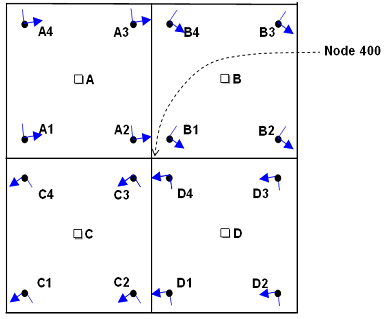Nodal Averaging of Elemental Results
Nodal averaging of elemental results at a node refers to the average of all the element corner results passing through that node.
 - when Use corner data is turned on.
- when Use corner data is turned on.
 - when Use corner data is turned off.
- when Use corner data is turned off.

- Simple
- Advanced
- Difference
- Max of Corner
- Min of Corner
- Extreme of Corner
These methods aggregate the maximum, minimum, or extreme values of all corner values and assign that to the centroid of the element. For example, when using the Max of Corner averaging method on element A: the maximum of A1, A2, A3, A4 is assigned to the element centroid.
- Maximum
- Minimum
In the example figure above, four elements are passing through Node 400. The maximum results at Node 400 is equal to:
max (A2, B1, C3, D4) - when
Use corner data is turned on.
max (A, B, C, D) - when Use corner data
is turned off.max with min in order to
compute the minimum results at Node 400 (based on the example figure above).